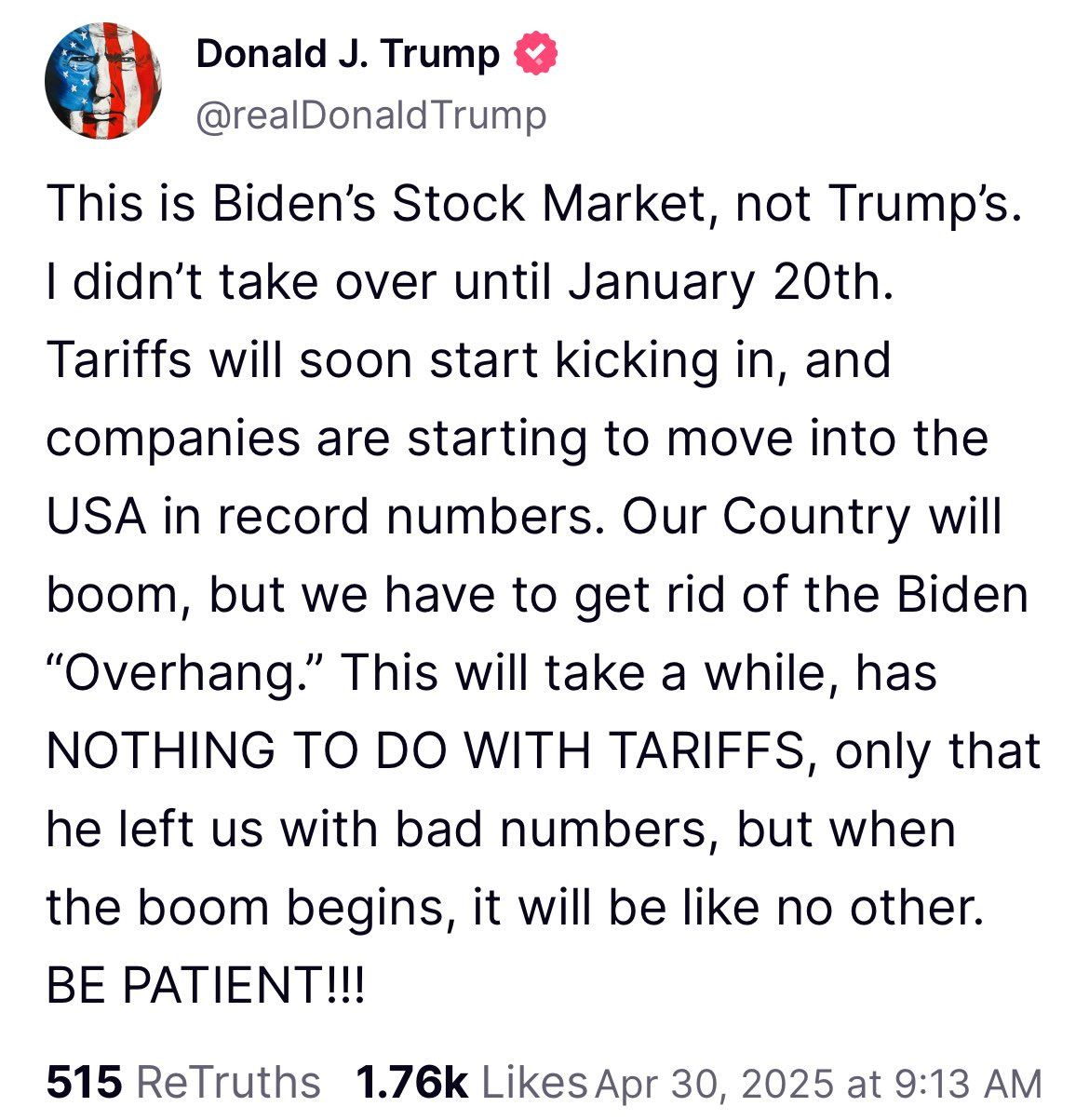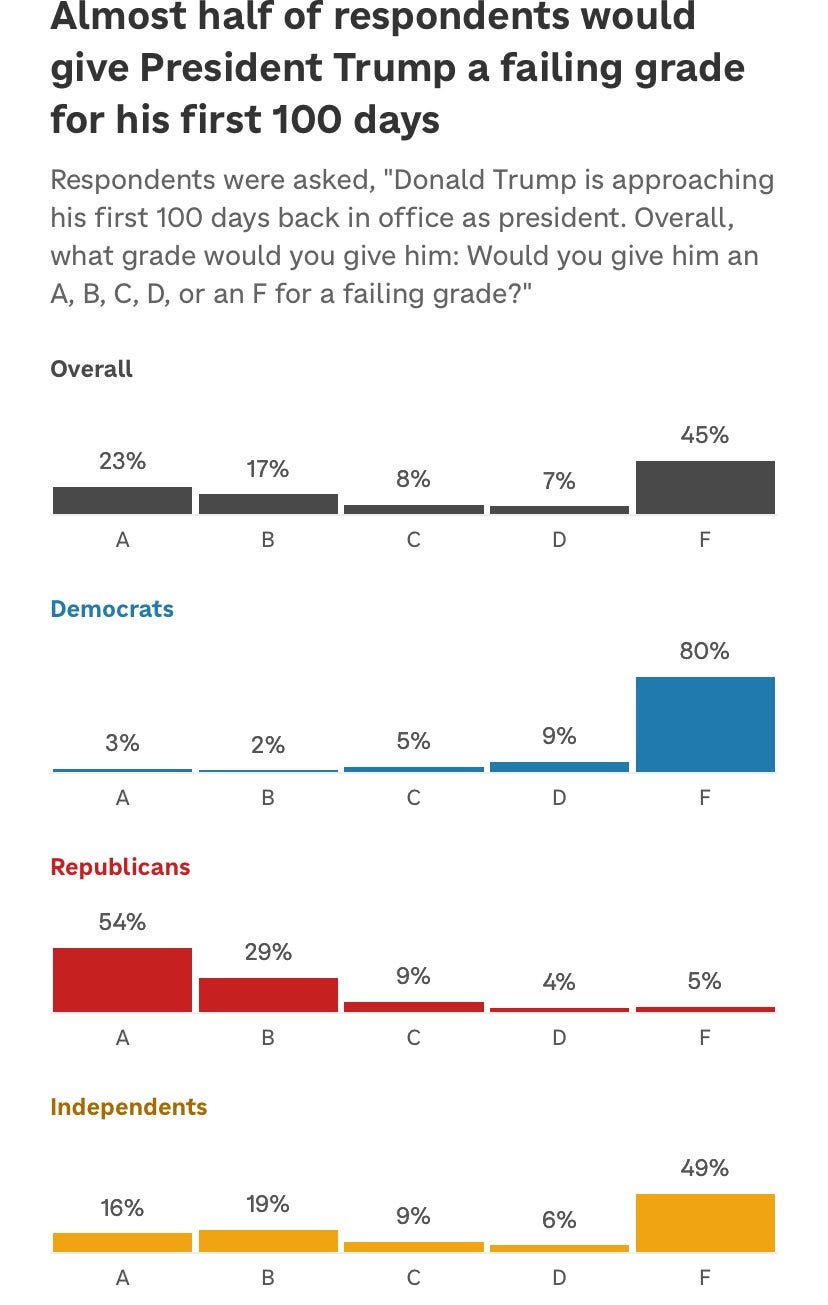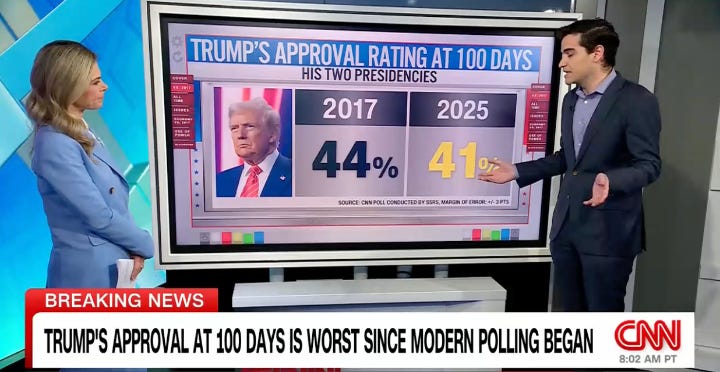Is there a statute of limitation on blaming the previous administration for the vicissitudes of the present stock market? I thought I’d post here some thoughts on the first 100 days of Trump.
As the fallout of Trump’s tariff policy continues to marinate (yuck), “47” attended a rally in Michigan last night. He was boisterous; he fed his reality distortion machine with the falsehood that he won in 2020; he danced the YMCA. In other words, greatest hits of the campaign rallies night! And at the rally Trump said he missed the campaign trail and no one can doubt that, as he is pretty terrible at actually governing (unless it is by EO). Donald Trump campaigns in profanity and governs in corruption.
More observations: First, the courts are holding—just barely. Nearly 250 lawsuits in only 100 days is never a good look for a new administration. Wisconsin rebuked Elon’s mercenary tactics, so Trump’s minions have focused on the state, to be sure. Because — retribution. But judges around the country — on disappearing migrants; on the merciless DOGE cuts — are holding the administration to account. Which is cause for some guarded optimism.
Further, Trump’s EO blitzkrieg only highlights the fact that Steve Bannon is the intellectual godfather of this movement, even as he has been “exiled” to the outer Siberia of the manosphere. Trump always turns on his friends, especially if they are more talented. Bannon’s “Flooding the zone,” however, is a phrase — and a political strategy — that is decidedly not within the purview of Marquis of Queensbury Rules. It is a “Trump Trap,” an instinctual level style of fighting that is influenced by Bannon’s military experience as well as the professional fighters that comprise a significant part of Trump’s inner circle.
In response to Trump’s blitzkrieg of EOs, influenced by the aforementioned gladiatorial class, the dying media has released a flurry of — what else? — polls (!) that are not insignificant. But pretty darn close! Still, we can at least analyze the data as Rome burns. The Washington Post-ABC News-Ipsos poll released last week found that nearly 2 out of 3 Americans disapprove of Trump’s handling of tariffs. This is an interesting development in that it reveals an unforced error on the part of a disciplined as well as chaotic administration. I say here “disciplined,” because here despite the disgusting hot-messiness of the rollout, Project 2025’s goals are uniformly being advanced …
This forward momentum cannot be dismissed outright, no matter how distasteful. The fact that Congress is staying out of the President’s way — particularly on the power of tariffs — frankly boggles the mind. “President Donald Trump on the campaign trail last summer disavowed Project 2025, saying he knew nothing about the effort,” noted a team of reporters at Politico in February. “ … A side-by-side review by POLITICO found dozens of cases where the president’s early executive actions have aligned with portions of the 922-page policy document, including some instances with nearly verbatim language lifted from the report to the White House.” The article, which notes 37 ways the Project’s goals ended up in EOs, continues:
Several of the ideas, such as energy policies expanding U.S. oil and critical minerals production, are longtime conservative policy priorities that did not originate with Project 2025. But some of the more unconventional strategies outlined in the document, such as reclassifying federal employees to make them easier to fire and installing loyalists in senior government positions, have also shown up in Trump’s executive orders.
There have also been other Trump administration moves outside of his executive orders that appear to come directly from Project 2025, such as directing the Federal Communications Commission to investigate NPR and PBS for alleged violations of sponsorship advertising rules.
I wrote last week about the politics of harassing public broadcasters, which does not strike me as wise. Another unforced error from heritage, not critiqued by the Trump administration. Sure, its easy to throw an overhand right at Big Bird, who lacks an oppositional thumb to defend himself from defunding. But will it liberate? And, since when are Eurocentric historical dramas so left-wing? This might be just more hot messiness — or at least strategic overreach — considering that for decades public broadcasters have been working to “conservative-proof” their programming. In New York, for example, the Sunday night anchor programming on PBS is all castle porn with the decidedly pro-life “Call the Midwife” as the lead-in. Where is the political roast beef for a right-winger to slash? NPR and PBS have gotten a lot better at programming in a politically divided era than in the days of getting caught flat-footed by Newt Gingrich and then again when the Republican Congress brought the scalpel in 2005. This particular bête noir of the far right seems a touch too performative for my tastes.
But Project 2025 wants what Project 2025 wants. And while data might indeed be a compelling Mistress, Trump is a jealous false god. “ … (T)his may be an overreach on the part of the Trump administration, because unlike Harvard or The New York Times, citizens of the red states actually like and consume public broadcasting on a regular basis,” I wrote. “NPR, for example, is a trusted news source in deep red areas of the country, like Southeastern Alabama (Troy Public Radio) and Fargo, North Dakota (KDSU). Even Reddit appears to take a rather benign view of NPR. I mean, who else broadcasts to Utqiaġvik, Alaska (KBRW-FM)?” So, there’s that.
But back to the pollercoaster. President Trump’s approval ratings among Independent voters in a number of polls released to coincide with the hundred days has dramatically fallen. And concern about the Economy, Social Security and health care are forefront in the minds of Americans nowadays. “A complete crash in Trump’s Indy numbers since the election,” political strategist (formerly Republican) Mike Murphy writes on X. “ “Inept, zig-zagging incompetence, epic trade policy stupidity and overall hapless buffoonery has a big political cost,” he concludes. Schadenfreude notwithstanding, Murphy is right. At the one-hundred day mark, only 23% of voters, according to the new NPR/PBS News/Marist poll would give Trump flying colors. And that is the same 23% is probably likely to vote for Trump in the event that he shoots someone on 5th Avenue, NYC, in broad daylight. (Averted Gaze)
But it is not just the Economy. It is also — and this is how you know it is pretty bad — Immigration, the President’s signature political issue. Because instead of passing the Lankford Border Security Plan, Trump went in for the most public and humiliating manner of dealing with the problem. "Fifty-six percent of independents disapprove of Trump's handling of immigration, while only 42 percent approve," wrote Greg Sargent in The New Republic. It appears that Trump’s overreliance on Stephen Miller’s irrational hatred of immigrants went too far in the direction of cruelty. And wouldn’t you love to hear Miller’s supervillain origin story. Why does he hate, with the core of his white-hot being, immigrants so badly? He hates them more than Charles Murray hates black people? We won’t even entertain the possibility that their own particular retribution-fixations might involve high school bullying …
So, when did it all go sideways? “Trump’s net approval, which turned negative in March, has been dented by mounting skepticism over his aggressive trade policies and gutting of the federal government,” writes Steff Chávez of the FT. So, Elon’s unelected DOGE crew and the introduction of tariffs.
There have been some victories on the part of the 47th President. And those victories are largely focused on Trump’s wielding the power of the office of the President against enemies perceived — in the fourth estate and in Big Law. Brian Stelter sums up the first 100 days from the mediacentric angle. From Reliable Sources:
Today, 100 days into Trump's second term, it's clear that the ABC settlement was a harbinger. It was "part of a broader strategy," Eric Cortellessa wrote in a recent TIME cover story. "Trump believed that if ABC would cave, so too would other companies worried about getting on his bad side, according to three sources familiar with his thinking."
This push and pull has been the overarching media story of Trump's first 100 days. Trump needs media attention, but wants it on his terms. Thus Voice of America is out (at least pending court appeals) and The War Room is in. He wants revenge against his critics and rah-rah coverage from, well, everyone. But is he getting it? Yes and no.
In the same way that some law firms cut deals while others went to court, and in the same way that some universities squirmed while others took a stand, some big media players have sought to placate Trump while others have decided not to play that game at all. As Tom Foreman writes in this 100-days piece for CNN.com subscribers, Trump's revenge tour is underway, "but so is a growing resistance."
via NPR
Perhaps most important of all the pollercoaster reporting is that in the most recent NPR poll, most respondents would give Donald a failing grade. But the resistance has a lot of work leading up to the midterms.
How does Trump of the hundred days compare to other Presidents in a similar amount of time? This, from Jonathan Alter of Washington Monthly leaves us with some good news:
Not just FDR and LBJ but Carter and Obama signed much more legislation early on than Trump, who has little to show legislatively so far. He is so convinced that he’s king — and so short-sighted and ignorant about the way government actually works — that he seems to believe that his executive orders have the force of law. Some are legitimate expressions of his lawful authority and will be upheld by the courts; others will turn out to be little more than rightwing press releases (e.g., overhauling local elections over which he has no legal authority); none are permanent. A Democratic president in 2029 can reverse them all.
Finally — I am loathe to copy any idea from the right. But what about a Project 2029? One that has as much of a single-minded focus as its predecessor, but on the subject of what Progressives can do to reverse some of the horrible effects of Trump’s version? One that can maybe bring us back into the better favor of our hemispheric neighbor, Canada.
“The last time I attended the White House Correspondents’ Dinner was 2011, the fateful year when President Obama roasted Donald Trump. As it happened, I was sitting at a Reuters table that night right behind Trump and watched the color of his neck turn from pale salmon to boiled magenta. His fury wasn’t just directed at Obama. It was aimed at the entire room of liberal laughing faces, that condescending media elite conjoined in their mockery of the vulgar, inept political pretender. The press now knows what his revenge feels like.” (Tina Brown)
“The post on African elites’ lack of ambition elicited a lot of reactions and mail … This post discusses recent comments regarding Kenyan elites by Doanh Chau, a Vietnamese energy executive. It does this for two reasons. First, the problem of lack of collective elite-level ambition across Africa is real and arguably getting worse. Therefore, it must constantly be called out in the clearest manner possible until the situation improves. Second, that the comment came from a Vietnamese executive is apt precisely because the critique gets to the point about the ingredients needed to move the needle (elite ambition and effective state systems that deliver results irrespective of regime type or overall quality of governance at the start); as opposed to the usual bromide (basically, become a democratic and free market society with Strong Western Institutions like Denmark then you’ll grow and become rich). Stated differently, Kenya stands to benefit a lot more from studying Vietnam’s ongoing economic takeoff (warts and all) than Denmark’s.” (Ken Opalo)
“A theme of this cycle’s gubernatorial races is open seats, so it’s fitting that before the flood of races in 2026, the pair of races contested this year, Virginia and New Jersey, are both open. We’ll go into more detail on the pair of 2025 races below, and then we’ll survey the 2026 races in tomorrow’s Crystal Ball. In 2021, the gubernatorial results in both states signaled an electorate that was souring on then-President Joe Biden after less than a year in office: While Republicans ended their 12-year statewide drought in Virginia that year, the more surprising result of the night was that they also came within about 3 points of denying Gov. Phil Murphy (D-NJ) a second term. The pair of states exhibiting that type of thermostatic reaction was hardly uncommon: For first-term presidents since George H. W. Bush, coming out with a net loss between the two states has almost been like taking the oath of office—it’s something that has invariably taken place during their first year. While the 2021 returns did not forecast 2022 in the same way that, say, 2009 and 2017’s results did for 2010 and 2018, respectively—for one thing, the Dobbs decision was handed down in the interim, which helped weaken the ‘typical’ midterm dynamics—we are still beginning this cycle with the aforementioned history in mind.” (Center for Politics)







